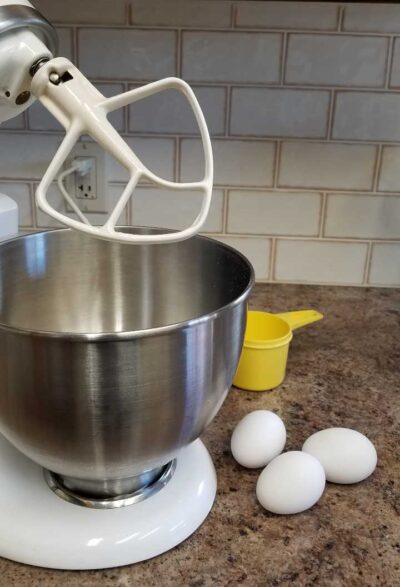 CRACKING EGGS
CRACKING EGGS
Do you spend a lot of time fishing eggshells out of your cake batter, omelette mixture, or other dishes you create that have eggs as an ingredient? I used to spend quite a bit of time fishing for eggshells.
I think most people crack eggs on the edge of a bowl. One day, many years ago, I noticed my mother-in-law cracking eggs by tapping them against the flat counter. I wondered if it worked better. It did! I hardly ever have to fish out eggshells anymore. Of course, you have to make sure the counter is clean and sanitary, so you don’t contaminate the eggs.
CLEANING EGG OFF OF BEATERS AND WHISKS
Cleaning the egg off of beaters and whisks can be a tedious job, but it doesn’t have to be. All you need to do is rinse them right away in tepid (neither warm nor cool) water. Water that is too warm will “bake” the egg on, and water that is too cool will “freeze” the egg on. You might also choose to swish the beater or whisk in a bowl of tepid water and let it soak.
them right away in tepid (neither warm nor cool) water. Water that is too warm will “bake” the egg on, and water that is too cool will “freeze” the egg on. You might also choose to swish the beater or whisk in a bowl of tepid water and let it soak.
PEELING BOILED EGGS
I used to somewhat dread making hard-boiled eggs for egg salad. I dreaded making them for deviled eggs even more, since the eggs for those need to be unmarred. My peeling of the eggs sometimes left some of them looking a little ugly. I usually boiled an extra egg or two, in case some didn’t turn out well. My husband was most happy to eat the extra ones, even if they looked a little unattractive.
 I had heard that you should “shock” hard-boiled eggs by putting them in ice water as soon as they’re done. That does help quite a bit. But after hearing that first trick, I later heard another one. You should also “shock” them by bringing the water to a very gentle boil before placing the eggs in it, rather than placing the eggs in cold water and then heating it up. To hard-boil eggs, you will need to cook them about 15 to 18 minutes. Of course the size of the eggs will have some effect on cooking time.
I had heard that you should “shock” hard-boiled eggs by putting them in ice water as soon as they’re done. That does help quite a bit. But after hearing that first trick, I later heard another one. You should also “shock” them by bringing the water to a very gentle boil before placing the eggs in it, rather than placing the eggs in cold water and then heating it up. To hard-boil eggs, you will need to cook them about 15 to 18 minutes. Of course the size of the eggs will have some effect on cooking time.
Now I carefully lower each egg into boiling water with a spoon, to avoid cracking them. Now that I shock them before cooking them by placing them in hot water, as well as shocking them afterwards with ice water, peeling the hard-boiled eggs is a breeze. After I tap all the way around the small half of the egg with the back of a spoon to crack the shell, the shell slides off so easily.
I’d been taught to add a teaspoon or so of salt to the water when it starts to boil, but I didn’t know why. According to the internet, salt helps prevent the eggs from cracking and oozing.
I even read that adding a bit of vinegar to the water helps the eggs peel more easily. That might be a good idea for soft-boiled eggs, since you wouldn’t want to put them in ice water when they’re done. Egg cups are nice for serving soft-boiled eggs. Some people cool the egg for about 3 minutes, then peel the egg. Others cut off the top of the egg, allowing it to be eaten by scooping out bites of egg from the shell. If you don’t have egg cups, you might want to slice the peeled egg in half the long way. In that case, you probably wouldn’t want the yolk too runny.
You may soft-boil eggs anywhere from 4 to 8 minutes, depending on how soft or firm you want the white and yolk. If you want the white firm, you should boil the egg at least 6 minutes.






Leave A Comment